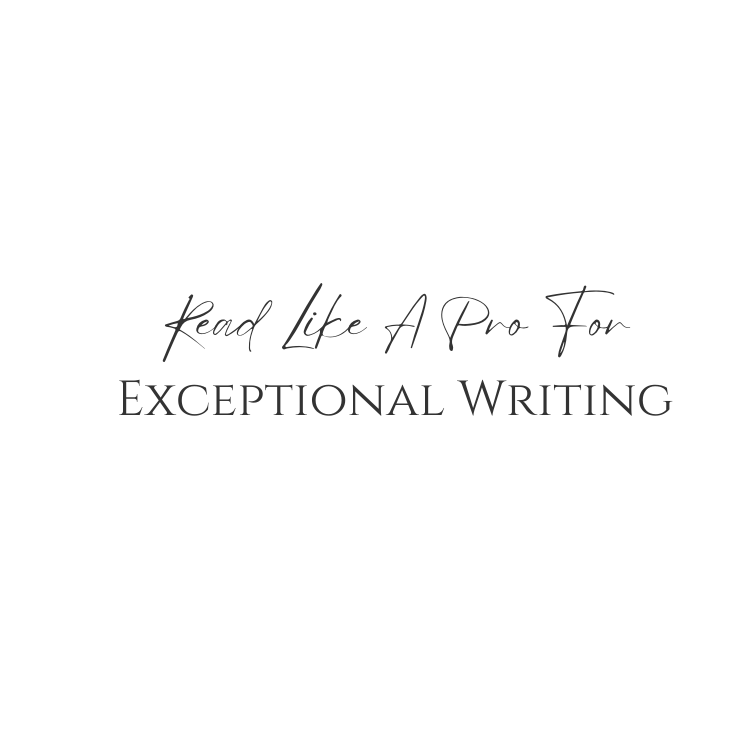Are you tired of writing mediocre prose? Do you want to enhance your writing skills and create exceptional content? Well, buckle up and get ready to read like a pro!

Reading is the foundation of exceptional writing, and to become an outstanding writer, you need to adopt sophisticated reading habits. As the saying goes, ‘you are what you read,’ and by reading widely and adopting healthy reading habits, you will notice a significant improvement in your writing skills.
Reading old books, classics, and works outside of your discipline will help you absorb qualities that make them great and improve your conversational writing skills. It’s time to expand your horizons and explore new genres, authors, and styles of writing. By doing so, you’ll develop a unique voice and style, and your writing will stand out from the rest.
Additionally, reading books about becoming a better person will stretch and challenge you, building empathy and skills that will make you a better writer. So, grab a book, find a cozy spot, and get ready to read like a pro for exceptional writing!
Key Takeaways for Exceptional Writing
- Adopt sophisticated reading habits to become an outstanding writer.
- Reading widely and diversely can greatly improve writing skills.
- Expanding literary horizons by venturing into genres and subjects outside of your comfort zone can greatly improve your writing skills.
- Actively seeking out diverse and challenging literature can make you a more empathetic and skilled writer.
Reading Habits for Exceptional Writing
If you want to improve your writing skills, you should avoid dangerous reading habits and adopt sophisticated ones. Instead of endlessly scrolling through digital content and getting lost in wonkish jargon, try reading more old books and classics. These books have stood the test of time and have fewer options to choose from, making it easier to identify what makes them great.

By reading classics, you’ll notice and absorb their exceptional qualities, allowing you to incorporate them into your writing. Another way to improve your writing skills is to read long-form journalism. This type of exceptional writing requires a conversational tone and the ability to build facts into a story, use dialogue, and make people central.
By reading long-form journalism, you’ll learn how to improve your conversational writing skills and make your writing more engaging. So, if you want to write like a pro, start by adopting these reading habits.
Expanding Your Horizons
Expand your literary horizons by venturing into genres and subjects outside of your comfort zone. Reading widely and diversely can greatly improve your exceptional writing skills. Here are four ways to start exploring new genres and discovering diverse perspectives:

- Pick up a memoir or a biography of someone from a different culture or background than your own. This will give you a glimpse into their lives and experiences, and help you develop empathy and understanding for people from diverse backgrounds.
- Try reading a book in a genre you’ve never explored before. If you usually read romance, try a thriller or a science fiction novel. This will help you expand your writing skills and give you new ideas to incorporate into your writing.
- Read books that challenge your beliefs and assumptions. If you tend to read books that reinforce your worldview, try picking up a book that challenges your beliefs. This will help you develop critical thinking skills and learn how to articulate your ideas more effectively.
- Finally, don’t be afraid to read books that are considered ‘difficult’ or ‘challenging.’ These books may require more effort to read, but they often offer unique perspectives and insights that can greatly improve your writing skills.
Incorporating these practices into your reading habits can help you become a more well-rounded and empathetic writer. By exploring new genres and discovering diverse perspectives, you’ll be able to incorporate new ideas and styles into your writing and develop a deeper understanding of the world around you.
Building Empathy and Skill
To build emotional intelligence and cultivate empathy through literature, it’s important to actively seek out books that challenge your beliefs and assumptions. Reading books about diverse experiences and perspectives can expand your understanding of the world and help you connect with others on a deeper level. It’s also important to read books that challenge you to confront difficult topics and explore complex emotions.
One way to approach this is to create a table of books that have helped you build empathy and emotional intelligence. In the left column, list the book title and author. In the middle column, write a summary of what the book is about. In the right column, describe how the book helped you build empathy or emotional intelligence. Sharing this table with others can help spark conversations and inspire others to read books that challenge and expand their worldview. By actively seeking out diverse and challenging literature, you can become a more empathetic and skilled writer.




